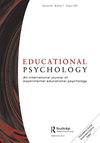家长和老师对ESL和非ESL学龄前儿童入学准备的看法
IF 3
2区 心理学
Q1 EDUCATION & EDUCATIONAL RESEARCH
引用次数: 0
摘要
摘要在本研究中,我们探讨了家长和老师对4岁英语为第二语言(ESL)儿童和母语为英语的4岁儿童入学准备(SR)的看法,并将这些看法与儿童成绩进行比较。儿童评估侧重于字母和数字知识。这些数据来自387名儿童(52%为男孩),其中28%为ESL儿童。调查收集了141名家长(每人评价一个孩子)和30名教师(每人评价380个孩子)的成人观点。研究结果表明:(a)儿童的字母和数字知识并没有因ESL水平的不同而有显著差异;(b)与非ESL儿童相比,教师(而非家长)对ESL儿童的识字知识评价明显较低;(c)教师和家长对儿童识字和算术知识的认知与儿童的成绩呈正相关,但程度较轻;(d)与家长的认知相比,教师对计算能力的认知与儿童对数字知识的认知更为一致。包括对这些发现的讨论。关键词:家长感知教师感知入学准备学龄前儿童英语作为第二语言致谢我们要感谢Kelly Moon Allison在早期草稿中提出的意见和建议。我们也要感谢Gail Gregg在项目开发过程中给予的帮助和支持。披露声明作者未报告潜在的利益冲突。本文章由计算机程序翻译,如有差异,请以英文原文为准。
Parent and teacher perceptions of ESL and non-ESL preschoolers’ school readiness
AbstractIn this study, we explore parent and teacher perceptions of school readiness (SR) among 4-year-olds learning English as a second language (ESL) and native English-speaking 4-year-olds and compare these perceptions to child scores. Child assessments focused on letter and numeral knowledge. These data were collected from 387 children (52% boys), including 28% ESL children. Adult perspectives were collected from 141 parents (who rated one child each) and from 30 teachers (who rated 380 children). Findings indicated (a) children’s letter and numeral knowledge did not significantly vary by ESL status; (b) teachers, but not parents, rated ESL children significantly lower on literacy knowledge compared to non-ESL children; (c) teacher and, to a lesser extent, parent perceptions of children’s literacy and numeracy knowledge were positively associated with children’s scores; and (d) teacher perception of numeracy was significantly more aligned with children’s numeral knowledge compared to parent perception. Discussion of these findings is included.Keywords: Parent perceptionsteacher perceptionsschool readinesspreschoolerEnglish as a second language AcknowledgementsWe would like to acknowledge and thank Kelly Moon Allison for her input and suggestions on an earlier draft. We would also like to thank Gail Gregg for her help and support during the development of this project.Disclosure statementNo potential conflict of interest was reported by the authors.
求助全文
通过发布文献求助,成功后即可免费获取论文全文。
去求助
来源期刊

Educational Psychology
Multiple-
CiteScore
6.40
自引率
6.20%
发文量
57
期刊介绍:
This journal provides an international forum for the discussion and rapid dissemination of research findings in psychology relevant to education. The journal places particular emphasis on the publishing of papers reporting applied research based on experimental and behavioural studies. Reviews of relevant areas of literature also appear from time to time. The aim of the journal is to be a primary source for articles dealing with the psychological aspects of education ranging from pre-school to tertiary provision and the education of children with special needs. The prompt publication of high-quality articles is the journal"s first priority. All contributions are submitted "blind" to at least two independent referees before acceptance for publication.
 求助内容:
求助内容: 应助结果提醒方式:
应助结果提醒方式:


